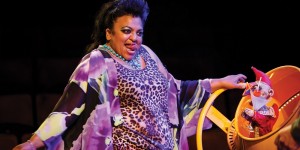The Beggar’s Opera and Dead Dog in a Suitcase
The world has grown old. There are no new stories, no new songs. We stick to what we know. Comfort-binge legends of sweet romance and poetic justice. Inarguable hard truths of self-serving cruelty.
This is the genius of John Gay’s Beggar’s Opera, and of Dead Dog in a Suitcase, the inspired new version by theatre company Kneehigh. Gay, writing in1728, set his story in contemporary London – the noose-dodging surge of pickpockets and hired informants, the harsh punishments suffered by the weak, skirted by the elite. There’s a tug of love triangle between star crim Macheath and the two women he casually marries – but Gay throws his romantic plot into the gin-soaked rookeries of Georgian London. He depicts criminal networks that pivot on blackmail – Peachum (based on the publicity-hound thief taker Jonathan Wild) runs a criminal enterprise, incentivising his network of crooks with the threat of turning them in if they don’t perform. But Gay also gestures to a wider world of political graft and pocket-lining policy – hopelessly inept, hopeless corrupt.
Kneehigh specialise in rorty, raucous, crowd-facing drama that doesn’t so much seduce an audience as pull it in tight for a sozzled, sweaty hug. Its best shows (Tristan and Isolde, Brief Encounter) are warm and wild, with a yearning core. Dead Dog in a Suitcase is certainly one of their best, but also something different – fiercely funny, but disillusioned, with a dangerous impatience that eventually breaks free.
In this version by Carl Grose, we’re in a nameless city, a sliver away from lawless. Peachum’s business seems legit (pilchards, mostly) – but he hires Macheath to waste the truth-digging mayor (the dog is collateral damage) and with his leopard-print helpmeet (Rina Fatania, pictured above: hilarious) stitches up the ensuing election. But Macheath’s a loose cannon in superman underpants, who knows too much and has been shagging a swathe through the ladies: knocking up many, marrying several. The mayor’s widow wants answers, pretty Polly Peachum wants to run away with Mac, and there’s a muddle of identical shiny black suitcases: people inadvertently swap cash, clothes, the fly-blown corpse of the mayor’s dead dog (cue pop-up flies).
The Beggar’s Opera is hard to pull off. It can seem an act of Hogarthian archaeology (by director Jonathan Miller) or genteel homage (in Benjamin Britten’s setting). The music director here, Charles Hazelwood, has worked on Gay’s ballad-opera before, and now pushes the sound world in all directions. Georgian ballad and shouty ska, r’n’b stylings (via Jack Shalloo’s genius doormat) or a bittersweet Winehouse twang – it’s all here. Some tunes that Gay uses (‘Over the hills and far away’; ‘Greensleeves’) wind through, as do trenchant numbers from the Brecht/Weill rewrite, The Threepenny Opera. There’s even a snatch of the clinking clanking sound of Cabaret.
These are terrific choices, because although they sound beguilingly familiar – I beamed whenever anyone started singing – their familiarity tugs you backwards. The car radio blares, but the wheels are spinning. Polly’s silvery voice imagines getting ‘over the seas and far away’ – but is this insubstantial ache the best we can imagine? She wants to go somewhere else, she tells her mum. ‘I’ve been there,’ snaps Fatania. ‘It’s shit.’
Scrub out the world and start again
Shoreditch Town Hall was the perfect London venue for the show – a Victorian building fallen among hipsters, jostled by shabby chic bars, meaty blowouts and implausible barbershops. New old, same old. Same on stage too – actor-musicians weave around the scaffolded set, with puppets and pole dancers, a Punch and Judy show acting as commentary. I don’t mean it as a sneer to say that there’s nothing new here – Mike Shepherd’s production swaggers magnificently in the moment – but the enveloping sense of stasis seems to be the point. Because three centuries on, this story is as maggoty as a rotting dog. The stench of bifurcated justice, merciless business ethics and politics tucked into someone’s pocket is still in our nostrils. Macheath may be the poster guy for this world, but he doesn’t pull its strings.
How do you solve a problem like Macheath? Murderous, bigamous, slippery as a swizzlestick, he’s heading for the hangman, no question. Gay, riffing off conventions of Handelian opera, grants him an implausible last-minute reprieve. Weill, more cynical yet, does the same. Grose, cannily, puts Mac’s escape in his own hands, and then asks what escape from this tired, murky world might mean. The finale throws cosy back in our faces, fills the space with smoke and bones, offering no shiny solutions but the yowling hope of scrubbing out the world and starting all over again.
Follow David on Twitter: @mrdavidjays



Leave a Reply